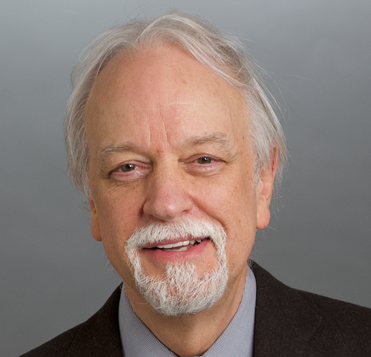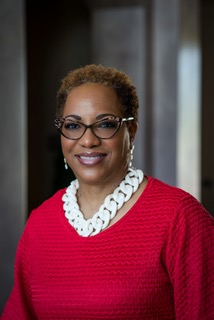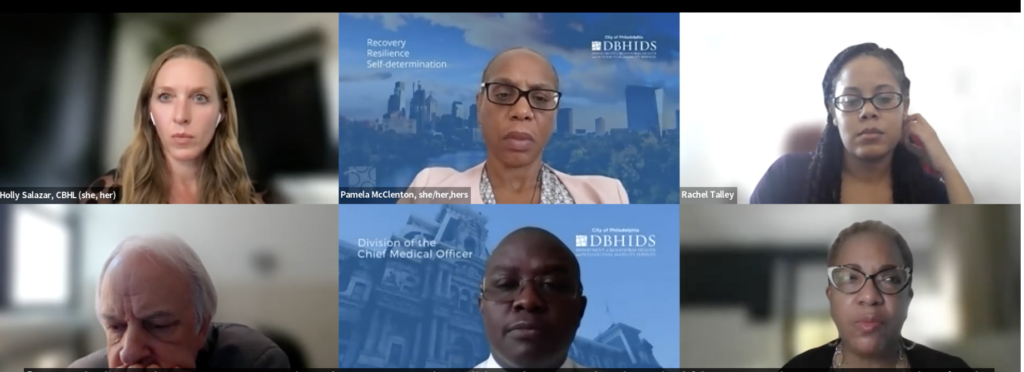This webinar will introduce participants to the Self-Assessment for Modification of Anti-Racism Tool (SMART), an innovative self-directed quality improvement tool developed by the American Association for Community Psychiatry (AACP) to assist community mental health organizations in addressing structural racism. The presenters will describe the process by which SMART was developed, including its grounding in input from community mental health providers and existing health inequity frameworks. The domains and items of SMART as well as its application process will be outlined. Presenters will also provide lessons from on-the-ground applications of SMART in diverse community mental health settings.
Participants will be able to:
- Describe the relevance of and importance of addressing structural racism in the community mental health setting
- Understand the 5 domains of the Self-Assessment for Modification of Anti-Racism Tool (SMART) tool, including literature evidence supporting the selection of SMART’s domains and items
- Understand the on-the-ground experience of applying SMART in diverse community mental health settings
Speaker Information

Rachel Talley, MD
Rachel Talley, M.D. is Assistant Professor of Clinical Psychiatry in the Department of Psychiatry at the University of Pennsylvania (UPenn). She is Director of the UPenn Department of Psychiatry’s Fellowship in Public and Community Psychiatry and is also an Associate Program Director for the UPenn Department of Psychiatry’s adult psychiatry residency program. She also directs the University of Pennsylvania’s Spaces of Color Initiative, a peer support program for Penn community members impacted by experiences of racism. She has several years of frontline clinical experience in community-based settings. Dr. Talley received her B.A. from Harvard University and her M.D. from Stanford University School of Medicine. She completed both her residency training in adult psychiatry and public psychiatry fellowship at Columbia University/New York State Psychiatric Institute. She has several peer-reviewed publications examining the integration of physical health services into behavioral health settings. She has been recognized for her teaching and leadership in community mental health, including receipt of the University of Pennsylvania Department of Psychiatry’s Albert Stunkard Faculty Recognition Award both in 2021 and 2022, and the 2021 Larry A. Real Award from the Montgomery County PA chapter of the National Alliance on Mental Illness (NAMI).

Sosunmolu Shoyinka MD, MBA
Dr. Sosunmolu Shoyinka is the Chief Medical Officer for the Department of Behavioral Health and Intellectual disAbility Services (DBHIDS). In this role, Dr Shoyinka utilizes a combination of health system policy and process improvement strategies to assure optimal population health for approximately 1.6 million Philadelphians. As Chief Medical Officer, Dr Shoyinka led the redesign of Philadelphia’s Crisis system, in preparation for the implementation of 988. Prior to this role, Dr. Shoyinka held several leadership positions. These include Medical Director for Sunflower and Home State Health plans and Director for the Missouri Behavioral Pharmacy Management program. The latter program resulted in cost savings of over $10 million over a decade. While at Centene, Dr Shoyinka co-led the design of a patent-pending analytic software platform that facilitates population health management for individuals with substance use conditions. He is also a co-developer of the SMART Tool, which facilitates self-directed antiracism work within organizations.
Dr. Shoyinka trained at Yale, Columbia, and NYU and holds an MBA from the Kelley School of Business. He serves on several national committees. These include the Board of the American Association for Community Psychiatry, the Medical Director Institute for the National Council, and the Group for the Advancement of Psychiatry. He also serves as voluntary faculty at the University of Pennsylvania and is a fellow of the Philadelphia College of Physicians. In 2021, he was recognized as a Black leader shaping the future of Psychiatry by the Scattergood Foundation. In May 2022, Dr. Shoyinka received a Special President Commendation Award from the American Psychiatric Association.

Pamela D. McClenton, LCSW
Pamela D. McClenton, LCSW is Senior Director of Clinical Quality for the Management of Diversity, Equity, and Inclusion for the Philadelphia Department of Behavioral Health & Intellectual disAbility Services, Division of Planning and Innovation. Pam’s social work career spans over 39-years. She has extensive experience in Child Welfare and Behavioral Health. Pam is a Licensed Clinical Social Worker in Pennsylvania and has been practicing as a mental health clinician for twenty-four years. She began her career with The City of Philadelphia at DBHIDS in 2004 and has served in numerous leadership capacities, including project manager for high-profile city initiatives The Mayor’s Task Force to Combat the Opioid Epidemic (2017) and The Mayor’s Curfew Center Initiative (2005-07). She developed and managed the DBHIDS Opioid Overdose Prevention and Narcan Rescue Training (2016-19) and successfully implemented the Department’s Emergency Protocol Response to the Opioid Epidemic (2018). In addition, Pam has served as a Steward for Local 2186 and Chair of the Quality of Work-Life Steering Committee for years. As Senior Director of Clinical Quality Management for Diversity, Equity and Inclusion, Pam leads the department’s internal and external DEI strategies and agendas. Since 2019 the DBHIDS DEI team led by Pam has developed a robust DEI presence. Through collaboration with internal and external stakeholders, the DEI team works to create a DEI-infused workplace culture where everyone can thrive and be authentic and included, have a voice, and feel valued, and achieve health, well-being, and self-determination. Pam is the recipient of prestigious awards and honors in recognition of her dedication and commitment: Commissioner’s Award (2018); Triumph Missionary Women of Honor Award (2018); Outstanding Leadership Award (2012); ACE Leadership Award (2007). Pam is a proud, thriving dyslexic neurodivergent who advocates relentlessly for people with invisible challenges. Pam stays busy with her business “Pamella on a Dime Home Design,” enjoys family time, and “loving on” her two beautiful grandchildren in her spare time.

Hunter L. McQuistion, MD
Hunter L. McQuistion, MD, is Clinical Professor of Psychiatry at NYU Grossman School of Medicine and medical director of the SAMHSA-funded EnTRy Program at the Family Health Centers at NYU Langone. Previously, he was chief of the Department of Psychiatry and Behavioral Health at NYC Health+Hospitals | Gouverneur, chief of outpatient and community psychiatry at St. Luke’s-Roosevelt Hospital, chief medical officer for mental hygiene services at the New York City Department of Health and Mental Hygiene, and medical director of Project Renewal, Inc., a New York City nonprofit offering comprehensive care for disabled adults who experience homelessness. He completed residency at NYU Medical Center, where he was also a chief resident, and completed the Fellowship in Public Psychiatry at the New York State Psychiatric Institute at Columbia University.
His expertise is managing public and community-based systems of care for people with mental health challenges, having practiced in emergency departments, inpatient and community outpatient environments, shelter-based therapeutic communities, housing programs, and street outreach. He has published, presented, and taught on issues in community mental health and the care of underserved and diverse populations, especially as they concern recovery orientation, advocacy, clinical engagement, psychiatric rehabilitation, and co-occurring substance misuse. He is a past president of the American Association for Community Psychiatry, a recipient of the National Alliance on Mental Illness (NAMI) Exemplary Psychiatrist Award, a Fellow of the New York Academy of Medicine, and a Distinguished Life Fellow of the American Psychiatric Association.

Rochelle Head-Dunham, MD, DFAPA, FASAM
Rochelle Head-Dunham, MD, DFAPA, FASAM, an Endowed Professor at LSU School of Medicine, is an Addiction Psychiatrist with academic appointments as Clinical Associate Professor and Clinical Assistant Professor of Psychiatry at LSU and Tulane University Schools of Medicine, respectively. Her past immediate appointments were Assistant Secretary and Medical Director for the Office of Behavioral Health (OBH) within the Louisiana Department of Health (LDH). In that capacity, she represented the state of Louisiana nationally as the Mental Health and Addictive Disorders Authority, serving as both the Commissioner of Mental Health for the National Association of Mental Health Program Directors (NASMHPD), and the Single State Agency Director for the National Association of Alcohol and Drug Abuse Directors (NASADAD).
Dr. Head-Dunham’s academic and administrative leadership has fostered noteworthy advances in the fields of addiction and mental health. She has served as a subject matter expert on various national and state platforms informing best practices for the field of behavioral health. Her clinical accolades include Clinical Faculty of the Year for the 2021 academic year at LSU School of Medicine. In 2019 she was the recipient of the Nyswander/Dole Award from the American Association for the Treatment of Opioid Dependence, INC. (AATOD). Both awards are demonstrative of her career success as a thought leader and strategist for programmatic and provider development, well documented by extensive lectures and trainings, both locally and nationally. Her clinical acumen coupled with her transformative management style has shaped an administrative career that fosters enduring changes for both systems, organizational and individual levels of performance.
Dr. Rochelle Head-Dunham is a New Orleans native who currently serves as the Executive Director and Medical Director for Metropolitan Human Services District (MHSD), a state local governing entity tasked with service delivery for indigent and Medicaid ensured persons living with mental illness, substance use disorders and intellectual/developmental disabilities, residing in Orleans and neighboring parishes.


